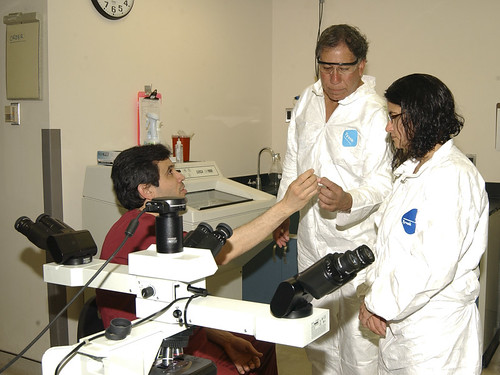
Two departments, one mission. That’s the reality for scientists working at Plum Island Foreign Animal Disease Laboratory in New York. The island—owned and operated by the Department of Homeland Security (DHS)—is critical to the USDA, Animal and Plant Health Inspection Service’s (APHIS) mission to protect U.S. livestock from the introduction and spread foreign animal diseases such as foot-and-mouth disease. It provides a biologically safe and secure location for APHIS scientists to diagnose animal diseases. For two weeks this spring, Plum Island was the site of an important component of our agriculture safeguarding system: sharing expertise and experience to build and strengthen the training, skills and capabilities of other nations, also known as international capacity building.
USDA and DHS welcomed 26 veterinarians responsible for evaluating animal disease outbreaks from 11 Spanish-speaking countries to a training called the International Transboundary Animal Disease (ITAD) Course, funded by the Organismo International Regional de Sanidad Agropecuaris (OIRSA). The course, provided entirely in Spanish, helps familiarize veterinarians with ten of the most serious animal diseases. The trainings provide a highly-trained global network capable of readily identifying and containing these diseases around the world, minimizing damage to animal agriculture and people’s livelihoods.
As a member of APHIS’ International Services leadership team, a program that helps to expand opportunities for trade while protecting American agriculture, I visited Plum Island and observed USDA staff and ITAD trainees interacting with different livestock species and simulating disease identification, sample collection and diagnosis. I was joined by Marketing and Regulatory Programs Under Secretary, Ed Avalos, who took the opportunity to speak with trainees and learn more about methods they use to protect agriculture in their home countries. The ITAD course was an opportunity on many levels; not only did it provide training, it also afforded opportunities for trainees to build relationships that will strengthen the animal health network should one encounter a disease issue in their country in the future.
Why is international capacity building so important to the APHIS mission? The value of U.S. agriculture depends on the ability to participate in safe agricultural trade around the world. An introduced foreign animal disease in U.S. cattle, swine, poultry or sheep could cause our trading partners to halt the export of animals, meat, and other animal products. One way that APHIS addresses the challenge of these diseases and mitigates their introduction into the United States is by making sure that our neighbors and trading partners have the same awareness of them that we do.

